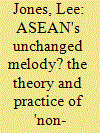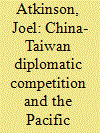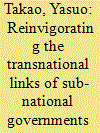|
|
|
Sort Order |
|
|
|
Items / Page
|
|
|
|
|
|
|
| Srl | Item |
| 1 |
ID:
097775


|
|
|
|
|
| Publication |
2010.
|
| Summary/Abstract |
The Association of Southeast Asian Nations (ASEAN) is widely supposed by theorists and commentators of many persuasions to have elevated the principle of absolute non-interference in the internal affairs of states into a central pillar of Southeast Asian regionalism. Non-interference is also criticised for retarding ASEAN from taking meaningful action over economic crises, problematic members like Myanmar, and transnational security threats. This article critiques this consensus, arguing that the norm has never been absolute, but has rather been upheld or ignored in line with the interests of the region's dominant social forces. While the principle formally remains in place despite such challenges and serious instances of violation, it is now subject to competing demands and contestation.
|
|
|
|
|
|
|
|
|
|
|
|
|
|
|
|
| 2 |
ID:
097772


|
|
|
|
|
| Publication |
2010.
|
| Summary/Abstract |
China and Taiwan have become important actors in South Pacific affairs due to their diplomatic rivalry. Securing the diplomatic recognition of the Pacific Islands countries is expensive for China and Taiwan. There are limits to what the rivals are willing to spend, and they attempt to reduce costs. This dynamic shapes how Taiwan and China engage Pacific Islands politicians. It also motivates their high level official visits to the region, and how they engage South Pacific regional organizations. Despite criticisms that China-Taiwan rivalry corrupts and destabilizes the South Pacific, the issue of whether China and Taiwan's diplomatic rivalry has been beneficial or detrimental to the region remains contentious. China and Taiwan appear to have recently called a truce in their decades-old rivalry. This tacit agreement is still tentative, and the involvement of China and Taiwan in the region has yet to change significantly. However, Taiwan has reportedly begun to reduce funding, and is likely to reform its aid delivery in order to satisfy demands from the South Pacific region's dominant power, Australia, and to improve its image as a humanitarian aid donor. China is also likely to reduce funding while the truce holds. However, China considers its ties with South Pacific governments more important than responding to Australian pressure, and is unlikely to reform its South Pacific aid programmes as a result of the diplomatic truce.
|
|
|
|
|
|
|
|
|
|
|
|
|
|
|
|
| 3 |
ID:
097776


|
|
|
|
|
| Publication |
2010.
|
| Summary/Abstract |
There has been a staggering decline in battle deaths in East Asia. Several recent studies have testified to this trend by referring to it as East Asian Peace. The decline in traditional conflict battle deaths does not, however, constitute peace. It could be possible that battle deaths have merely moved to less traditional types of conflict. The purpose of this article is to see whether the decline in battle deaths has brought about genuine peace.
|
|
|
|
|
|
|
|
|
|
|
|
|
|
|
|
| 4 |
ID:
097773


|
|
|
|
|
| Publication |
2010.
|
| Summary/Abstract |
The global financial crisis has shattered many illusions, one of which being that sovereign wealth funds (SWFs) are properly treated as arms-length investment institutions subject only to global standards of good governance. In fact, in a number of East Asian countries SWFs have acted as 'insurers of last resort' for their nation-states underwriting financial stability and social welfare. In this paper, we explain how and why this came to pass, arguing that this role serves to sustain the legitimacy of the nation-state as well as justify the separation of SWF assets from the public interest in current consumption and spending. Focusing upon the Government of Singapore Investment Corporation (GIC), we suggest that the prospect of recurrent financial crises was an important prompt for its establishment in 1981, reinforced by the experience of many East Asian countries in the 1997 Asian financial crisis. The formal constitution of the GIC, the mechanisms by which its reserves are returned to the government in crisis, and the role of different sections of the political elite in managing those assets are explained. Referencing the principles of best-practice fund governance and the Santiago Principles underwriting the legitimacy of SWFs, we also consider the governance of the GIC, especially as regards its investment processes. Implications are drawn for the experience of Western countries, particularly the UK and the USA, wherein the failure of their banking systems has put untold pressures on current and future living standards.
|
|
|
|
|
|
|
|
|
|
|
|
|
|
|
|
| 5 |
ID:
097777


|
|
|
|
|
| Publication |
2010.
|
| Summary/Abstract |
This article presents a reinterpretation of Japan's responses toward China's pressure over the Yasukuni issue. It is generally taken for granted that Japan's official responses to China's pressure over the issue are determined by the personality of individual leaders, the emergence of Japanese conservative nationalism and the calculations of Japan's national interests with regard to China's strategic role. With the examination of two cases during the Koizumi and Abe administrations between 2001 and 2007, this paper offers an alternative interpretation by highlighting the rationality of individual political actors and the primacy of domestic political survival. The article suggests domestic political legitimacy of individual leaders is a vital factor that affects Japan's official responses to China's pressure over the Yasukuni issue.
|
|
|
|
|
|
|
|
|
|
|
|
|
|
|
|
| 6 |
ID:
097774


|
|
|
|
|
| Publication |
2010.
|
| Summary/Abstract |
The study of transnational links between sub-national governments is a lacuna in the field of international relations yet the issue on inter-sub-national government cooperation has recently gained greater importance at the international level. Since the 1992 Earth Summit recognition of sub-national authorities as key players in global sustainable development strategies, the importance of decentralised cooperation between sub-national governments has been strengthened by a series of international standardisation and domestic incorporation of this principle. Yet our research raises serious questions about the degree to which Australia-Japan twinning of sub-national governments has made progress towards taking responsibility in facing global challenges. Our case study of Western Australia-Hyogo sister-state relationships shows that their 25 year-old cooperation has been suffering from a lack of awareness of the emerging role of sub-national governments. Not surprisingly, national government policy and position has greatly influenced the nature and patterns of their relationships. Australia and Japan twinning, as leading inter-sub-national partnerships in the region, can do more to promote the value of the local dimension in international development cooperation. In light of these challenges, the future of their twinning must lie in a structured long-term commitment for global strategies as well as mutual benefits.
|
|
|
|
|
|
|
|
|
|
|
|
|
|
|
|
|
|
|
|
|